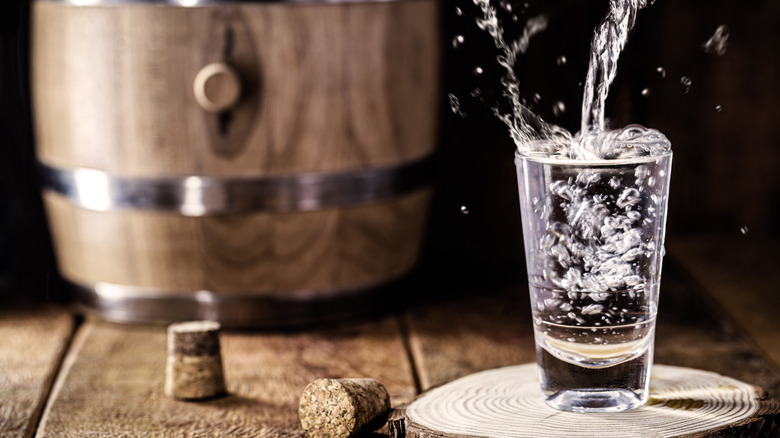Is Vodka Really Made From Potatoes?
If someone put you on the spot and asked you what vodka is made from, potatoes would likely spring to mind. However, most vodka isn't actually distilled from potatoes!
According to Vinepair, the drink originated in Eastern Europe, likely Russia or Poland, sometime in the 8th or 9th century. By the 14th century, vodka got its name. Like whiskey, which comes from a Gaelic term meaning "water of life," the word "vodka" comes from the Slavic word "voda," which means "water."
Since early vodka was fairly foul-tasting, it wasn't typically drunk recreationally until distillers perfected the process over centuries. Instead, the drink was used medicinally, branded as a wonder drug that could cure a variety of ailments, including the plague. DrinkStack writes that, over time, the distillation process became more refined. As Russian immigrants and refugees—including the founder of Smirnoff—traveled abroad in the 19th century, the drink became increasingly popular around the world. Now, Beverage Dynamics writes that vodka comprises one-third of cocktail sales, making it the most popular spirit in the United States. So what is vodka distilled from?
Vodka can be made from just about anything
If you know the history of the potato, you know that potatoes weren't brought to Europe until the 16th century (via History Magazine). Before that, the drink was typically made from grains. To this day, most vodka is made from grains like corn, rice, and wheat, but potatoes are an option because according to Vinepair, vodka "can be distilled from any agricultural product containing sugar or starch." Potatoes, beets, and rice are all starchy options. The Alcohol and Tobacco Tax and Trade Bureau defines vodka as a "neutral spirit distilled or treated after distillation with charcoal or other materials," and "bottled at not less than 40% alcohol by volume (ABV)."
Some distilleries make vodka from grapes, hempseed, and even coffee pulp—the fruit surrounding the coffee bean, which is typically discarded. Water, which typically comprises about 60% of the drink, is surprisingly important, though. According to Liquor.com, the quality of the water used in vodka production can have a major effect on the taste, more so than in other spirits. Distillers know this, too: High-quality vodkas use water sourced from springs and glaciers. Keep the flavor and quality of the water you use for ice in mind when serving vodka neat. Poor quality ice can have a big impact on the drink's subtle flavor.

